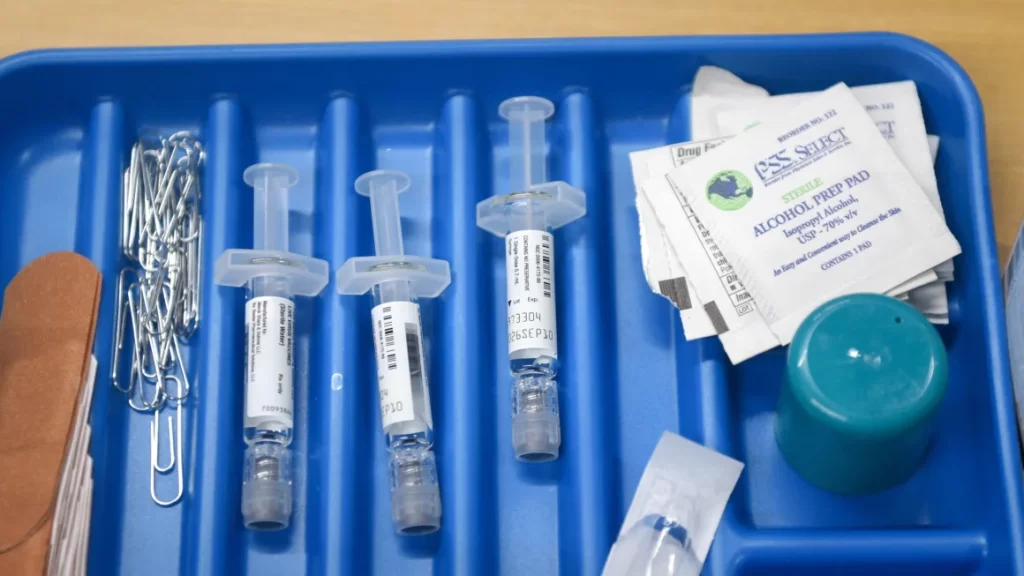
A 13-year-old child with subacute sclerosing panencephalitis, a degenerative neurological condition that can be lethal, was treated by Dr. Alexandra Cvijanovich’s team in Utah during the early 2000s while she was finishing her medical education. It is an uncommon measles virus consequence that manifests years after the initial infection.
When the boy was 7 months old, he came into contact with an unvaccinated child and contracted measles. He passed away from the complications years later, but Cvijanovich has never forgotten him.
Before he could receive the vaccination, he contracted the infection. And that’s simply a terrible, tragic death that could have been avoided,” she remarked.
The first dose of the measles-mumps-rubella (MMR) vaccination should be administered to youngsters between the ages of 12 and 15 months, according to officials. The vaccination is 97% effective against the measles virus after two doses.
According to the US Department of Health and Human Services, 95% of the population must be vaccinated in order to develop herd immunity, which occurs when enough people are vaccinated that infection doesn’t spread widely in the community.
Cvijanovich, who is today a pediatrician in Albuquerque, New Mexico, serves patients from all across the state, including the southeast, which is currently experiencing one of the worst measles outbreaks in decades, with over 300 cases spread over three states.
When families are reluctant to vaccinate their children, she frequently shares the story of her 13-year-old patient.
In addition to trying to convince individuals that they genuinely consider the larger welfare of the community around them, she stated, “I tried to use stories of patients that I’ve taken care of.”
Parents who are reluctant to vaccinate their children with the MMR vaccine and other vaccines are becoming more prevalent, according to many pediatricians. Here are a few of their suggestions for interacting with parents who are worried about vaccinations.
Do: Attend to certain issues
Addressing each family’s unique worries is crucial when discussing vaccinations with them, according to experts.
According to Dr. Edith Bracho-Sanchez, a primary care pediatrician at Columbia University Irving Medical Center, “the most effective strategy for me and my practice has been to tailor your approach and your communication to that family-specific concern.” “Families feel more secure about their decision because of that.”
For certain families, this involves addressing concerns regarding adverse impacts that they might learn about via local tales. According to pediatricians, these frequently spread through parent Facebook groups or in family or neighborhood WhatsApp groups.
Pull it up and let’s look it up together, I’m saying now. From whence did it originate? Are you acquainted with this individual? Are you aware of their entire medical history? “Said Bracho-Sanchez.” “And I do spend time explaining the difference between someone experiencing something as a result of the vaccine and someone experiencing something around the time they received the vaccine.”
Experts advise people to speak with their clinicians directly rather than relying on community social media for medical advice or information.
Certain vaccination elements may raise problems for other families; doctors advise finding out which ones, such as metals or preservatives, are causing these issues. According to Dr. Christina Johns, a pediatric emergency physician at PM Pediatrics in Annapolis, Maryland, those concerns can be allayed by describing how those same substances may also be present in meals or other exposures encountered in daily life.
Don’t: Allow patients to lose sight of how serious their condition is
According to Cvijanovich’s personal experiences, it can be beneficial to educate patients about the diseases that vaccinations are avoiding.
According to Johns, “vaccines have been victims of their own success.” Many of these diseases that can be prevented by vaccination are no longer common, and people tend to disregard them. Furthermore, the truth is that they are a huge deal.
The repercussions of measles can be dire. One in 20 children who have measles will have pneumonia, one in 1,000 children who have measles will get encephalitis, or swelling of the brain, and one in five unvaccinated measles patients will end up in the hospital.
According to the US Centers for Disease Control and Prevention, complications from measles will cause one in every 1,000 children to pass away. The continuing measles outbreak has already been linked to two deaths, including one of a school-age child who was not vaccinated.
“The best part of my job as a pediatrician is seeing my patients grow up,” Cvijanovich stated. I mean, that’s the reason I show up for work each day. Seeing newborns grow up and then go middle school, high school, and college is something I adore. That’s amazing. And the best tool I have to accomplish this is vaccines.”



